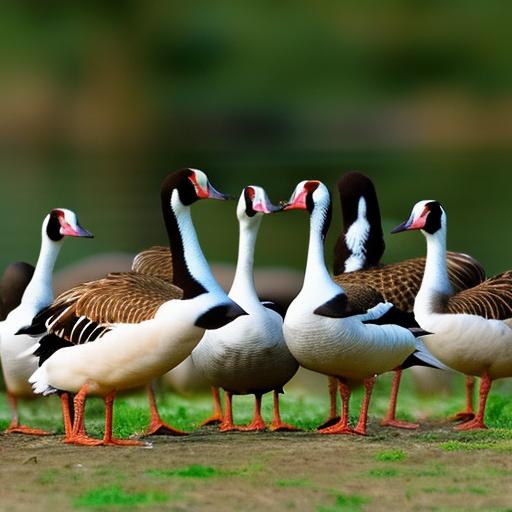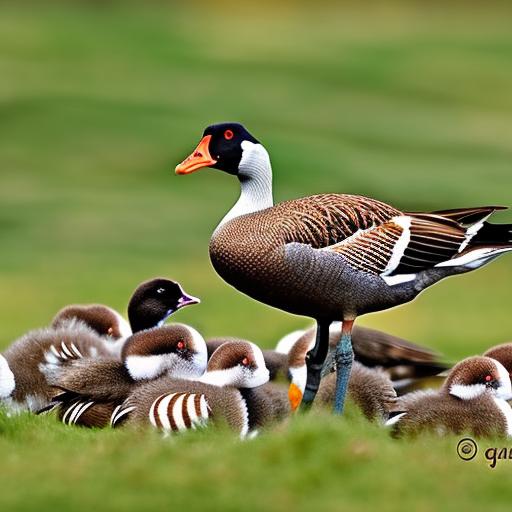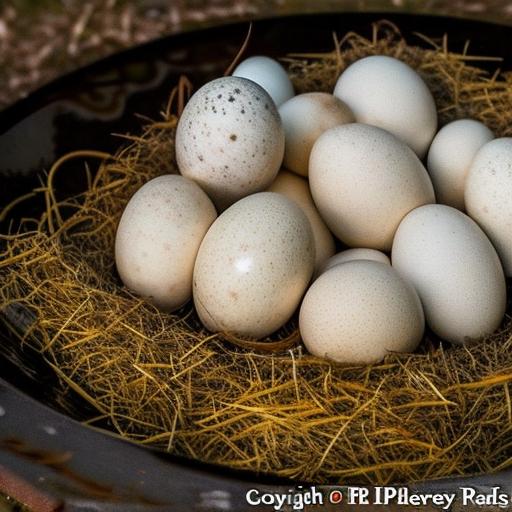African geese are a popular breed of domesticated geese known for their large size and distinctive appearance. They are native to Africa and have been bred for centuries for their meat, eggs, and feathers. African geese are highly valued for their delicious meat, which is lean and flavorful. They also lay large eggs that are prized by many for their rich taste. In addition, their feathers are used in various crafts and decorations.
Breeding African geese is an important practice for ensuring the sustainability of the breed. By carefully selecting breeding pairs and maintaining genetic diversity, breeders can help preserve the unique characteristics of African geese. This is especially important as the demand for these birds continues to grow. By breeding African geese responsibly, breeders can contribute to the conservation of this valuable breed.
Key Takeaways
- African geese breeding is a rewarding and profitable venture.
- Male and female African geese have distinct physical and behavioral differences.
- Choosing the right breeding pair is crucial for successful breeding.
- Proper preparation and understanding of breeding behavior are essential for success.
- Successful breeding requires careful attention to nutrition, environment, and health.
Understanding the Differences Between Male and Female African Geese
Male and female African geese can be distinguished by both their physical characteristics and their behavior. Males, known as ganders, are generally larger than females, known as geese. They have a larger body size, longer necks, and a more prominent knob on their beak. Females, on the other hand, have a smaller body size and a shorter neck.
In terms of behavior, male African geese are typically more aggressive and territorial than females. They will often defend their territory and mate from other males. Females, on the other hand, are more nurturing and protective of their eggs and young. They will build nests and care for their offspring until they are old enough to fend for themselves.
Selecting the Right Breeding Pair for African Geese
When selecting a breeding pair of African geese, there are several factors to consider. First and foremost, it is important to choose birds that are healthy and free from any genetic defects or diseases. This will help ensure that the offspring are strong and have a good chance of survival.
It is also important to consider the genetic diversity of the breeding pair. Inbreeding can lead to a decrease in genetic diversity and an increased risk of genetic disorders. By selecting birds from different bloodlines, breeders can help maintain a healthy and diverse population of African geese.
Preparing Your African Geese for Breeding Season
Preparing your African geese for breeding season is crucial for successful breeding. This includes providing them with a suitable breeding environment and ensuring that they are in good health.
To prepare your geese for breeding season, it is important to provide them with a clean and spacious nesting area. This can be a simple nest box or a designated area with straw or other nesting materials. It is also important to provide them with plenty of fresh water and a balanced diet to ensure that they are in optimal health.
Understanding African Geese Breeding Behavior
African geese have specific breeding behaviors that are important to understand in order to successfully breed them. Breeding usually occurs during the spring and summer months when the weather is warmer and food is abundant.
During breeding season, male African geese will often display courtship behavior towards the females. This can include head bobbing, wing flapping, and honking. The male will also often chase after the female and attempt to mount her as part of the mating process.
The Role of Male African Geese in Breeding

Male African geese play an important role in the breeding process. They are responsible for fertilizing the eggs laid by the female. It is important to select a good male breeder who is healthy, strong, and has good genetics.
When selecting a male breeder, it is important to choose one that is not overly aggressive or dominant. This can lead to problems within the flock and may result in injuries or stress for the females. It is also important to choose a male that is compatible with the females in terms of size and temperament.
The Role of Female African Geese in Breeding
Female African geese are responsible for laying and incubating the eggs. They play a crucial role in the breeding process and should be selected carefully.
When selecting a female breeder, it is important to choose one that is healthy and has good genetics. It is also important to choose a female that has a good temperament and is capable of caring for her eggs and young. Females that are too aggressive or neglectful may not be suitable for breeding.
Tips for Successful African Geese Breeding
Breeding African geese can be a rewarding experience, but it requires careful planning and attention to detail. Here are some tips for successful breeding:
1. Monitor your breeding pair closely: It is important to closely monitor your breeding pair to ensure that they are mating successfully and that the female is laying eggs.
2. Provide a suitable breeding environment: Make sure that your geese have access to a clean and spacious nesting area with plenty of nesting materials.
3. Maintain a balanced diet: Providing your geese with a balanced diet that includes plenty of fresh water, greens, and protein will help ensure that they are in optimal health for breeding.
Common Challenges in African Geese Breeding
Breeding African geese can come with its fair share of challenges. Some common challenges include:
1. Infertility: Sometimes, breeding pairs may have difficulty producing fertile eggs. This can be due to various factors such as age, health issues, or genetic problems.
2. Egg loss: It is not uncommon for some eggs to be lost during the incubation process. This can be due to various factors such as improper incubation conditions or predation.
3. Aggression: Male African geese can sometimes become overly aggressive during the breeding season. This can lead to injuries or stress for the females.
The Rewards of Breeding African Geese
Breeding African geese can be a rewarding experience for both hobbyists and commercial breeders. Not only do they provide delicious meat, eggs, and feathers, but they also contribute to the conservation of this valuable breed.
By following responsible breeding practices and selecting breeding pairs carefully, breeders can help ensure the sustainability of African geese. This includes maintaining genetic diversity, monitoring the breeding pair closely, and providing a suitable breeding environment.
Breeding African geese requires time, effort, and dedication, but the rewards are well worth it. Whether you are breeding for personal enjoyment or for commercial purposes, African geese can provide a valuable addition to your flock.
If you’re interested in African geese breeding and want to learn more about the dynamics between male and female geese, you should definitely check out this informative article on Poultry Wizard. It provides valuable insights on how to care for goslings, which is crucial for successful breeding. Understanding the specific needs and requirements of these adorable creatures is essential for their well-being and the overall success of your breeding program. To read more about it, click here: https://poultrywizard.com/breeding-geese/how-to-care-for-goslings/.
FAQs
What are African geese?
African geese are a domesticated breed of geese that originated in Africa. They are known for their large size, distinctive knob on their beak, and their ability to lay a large number of eggs.
How do you breed African geese?
To breed African geese, you need to have a male and female goose. The male will fertilize the female’s eggs, which will then hatch into goslings. It is important to provide a suitable nesting area for the female to lay her eggs and for the goslings to hatch and grow.
How can you tell the difference between male and female African geese?
Male African geese are typically larger than females and have a more prominent knob on their beak. They also tend to have a louder honk than females. However, the most reliable way to determine the sex of an African goose is by examining their reproductive organs.
How many eggs do African geese lay?
African geese are known for their high egg production, with females laying up to 50 eggs per year. However, the number of eggs can vary depending on factors such as age, diet, and breeding conditions.
What is the incubation period for African goose eggs?
The incubation period for African goose eggs is approximately 28-34 days. During this time, the female will sit on the eggs to keep them warm and ensure proper development.
What should you feed African geese?
African geese should be fed a balanced diet that includes a mix of grains, vegetables, and protein sources such as insects or mealworms. It is important to provide them with access to fresh water at all times.
What are some common health issues that African geese may face?
African geese may be susceptible to a variety of health issues, including respiratory infections, parasites, and foot problems. It is important to provide them with proper nutrition, clean living conditions, and regular veterinary care to prevent and treat these issues.
Meet Walter, the feathered-friend fanatic of Florida! Nestled in the sunshine state, Walter struts through life with his feathered companions, clucking his way to happiness. With a coop that’s fancier than a five-star hotel, he’s the Don Juan of the chicken world. When he’s not teaching his hens to do the cha-cha, you’ll find him in a heated debate with his prized rooster, Sir Clucks-a-Lot. Walter’s poultry passion is no yolk; he’s the sunny-side-up guy you never knew you needed in your flock of friends!







